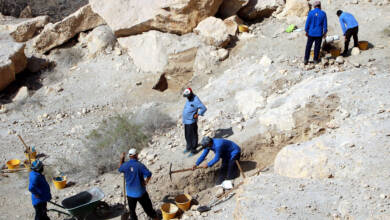We all depend on the survival of bees
Bees and other pollinators, such as butterflies, bats and hummingbirds, are increasingly under threat from human activities.

Pollination is, however, a fundamental process for the survival of our ecosystems. Nearly 90% of the world’s wild flowering plant species depend, entirely, or at least in part, on animal pollination, along with more than 75% of the world’s food crops and 35% of global agricultural land. Not only do pollinators contribute directly to food security, but they are key to conserving biodiversity.
To raise awareness of the importance of pollinators, the threats they face and their contribution to sustainable development, the UN designated 20 May as World Bee Day.
The goal is to strengthen measures aimed at protecting bees and other pollinators, which would significantly contribute to solving problems related to the global food supply and eliminate hunger in developing countries.
We all depend on pollinators and it is, therefore, crucial to monitor their decline and halt the loss of biodiversity.
Bee engaged!
The recent COVID-19 pandemic has had an undeniable impact on the beekeeping sector affecting the production, the market and as a consequence, the livelihoods of beekeepers.
This year, World Bee Day will therefore focus on bee production and good practices adopted by beekeepers to support their livelihoods and deliver good quality products.
To mark the Day, a virtual event – under the theme “Bee Engaged” – will highlight the importance of traditional knowledge related to beekeeping, the use of bee-derived products and services, and their importance in achieving the SDGs.
Why do we need pollinators?
Pollinators allow many plants, including many food crops, to reproduce. Indeed, the food that we eat, such as fruits and vegetables, directly relies on pollinators. A world without pollinators would equal a world without food diversity – no blueberries, coffee, chocolate, cucumbers and so much more. They also serve as sentinels for emergent environmental risks, signaling the health of local ecosystems.
Pollination, a pillar of our ecosystems
Pollinators not only help ensure the abundance of fruits, nuts, and seeds, but also their variety and quality, which is crucial for human nutrition. Beyond food, pollinators also contribute directly to medicines, biofuels, fibers like cotton and linen, and construction materials.
The vast majority of flowering plant species only produce seeds if animal pollinators move pollen from the anthers to the stigmas of their flowers. Without this service, many interconnected species and processes functioning within the ecosystem would collapse.
Pollination is therefore a keystone process, in both human managed and natural terrestrial ecosystems. It is critical for food production and human livelihoods and directly links wild ecosystems with agricultural production systems
Bees, the ambassadors of pollinators
Most of the 25,000 to 30,000 species of bees (Hymenoptera: Apidae) are effective pollinators, and together with moths, flies, wasps, beetles, and butterflies, they make up the majority of pollinating species. But the diversity of pollinators and pollination systems is striking.
Indeed, there are also vertebrate pollinators, including bats, non-flying mammals (such as several species of monkey, rodents, lemur, tree squirrels, olingo, and kinkajou) and birds (hummingbirds, sunbirds, honeycreepers and some parrot species).
Current understanding of the pollination process shows that, while specific relationships exist between plants and their pollinators, healthy pollination services are best ensured by an abundance and diversity of pollinators.
No pollinators, no SDGs!
The diversity of pollinators have a direct and positive impact on crop yields. Bees and other pollinating insects are, in fact, improving the food production of 2 billion small farmers worldwide, helping to ensure food security for the world’s population. Honey hunting of wild bee colonies also remains an important part of the livelihoods of forest-dependent peoples in many developing countries. Conversely, the decline of these species has many consequences on our ecosystems and on the quality and quantities of food crops, with a direct consequence of an imbalance in diets and a depletion of natural resources, as well as an impoverishment of populations. The health and even the lives of billions of people will be affected and, therefore, many sustainable development goals (SDGs), such as the one aiming at ending world hunger and the one aiming at preserving and restoring terrestrial ecosystems, will no longer be attainable.
Adapting to changing climates
A diverse assemblage of pollinators, with different traits and responses to ambient conditions, is also one of the best ways to minimize risks due to climate change. Their diversity ensures that there are effective pollinators not just for current conditions, but for future conditions, as well. As a result of biodiversity, resilience can therefore be built in agro-ecosystems.




